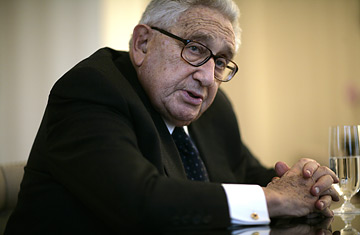
Henry Kissinger speaks during an interview in Washington.
(3 of 3)
We've talked briefly about the domestic situation in Russia. Doesn't the U.S. have an interest in speaking out about things like the curtailing of political freedom and civil liberties?
It is important to understand what Putin represents. Putin is not a Stalin who feels obliged to destroy anyone who might potentially at some future point disagree with him. Putin is somebody who wants to amass the power needed to accomplish his immediate task. Therefore we do not observe a general assault on civil liberties. We do see the infringement of civil liberties of groups who, in his view, threaten the regime. The process is uneven. Television is controlled; newspapers are substantially free. But the idea that America has the power to change Russia's domestic structure by threats is an invitation to permanent crisis. America has to stand for democratic values. And it should seek to advocate human rights. But it has to bring these goals into relationship with other objectives.
Both Putin and Bush are entering their last year as Presidents. You speak to both of them. What can they achieve together before they leave office?
Putin does not want to see a hegemonical United States, because a hegemonical United States by definition has no restraints on it as far as Russia is concerned. So where he can, he will try to balance us: not deprive us of where we are but keep us from going further. At the same time, in Putin's geostrategic conception, America would be the logical partner for Russia. We're not on Russia's border. We don't want any of Russia's territory. We have no history of wanting Russian territory, and we are very powerful. We can collaborate on global security. And prestige attaches to Russia for being associated with us. All this reality provides opportunities if we can relate our missionary bent to strategic objectives. Iran, the Middle East peace process, a global approach to non-proliferation are all opportunities.
What does Russia believe it has to gain from a partnership with the U.S.?
First of all, security. Secondly, prestige. Thirdly, economic cooperation on global issues. Russia touches Asia, the Middle East and Europe. And it has no natural allies anywhere. It has no tradition of willing allies where it had no soldiers. Historically, it identified its greatness with an expansionist foreign policy. Now the imperialist aspect of Russian policy has ended the cold war. They no longer have the resources to do it. That requires a new Russian policy but also some time to develop it and get used to it.
How will historians assess Putin's presidency and his significance?
For Americans it's hard to get into the Russian psyche. If you take the great Russian reformers, like Peter the Great or Catherine the Great, they were very autocratic at home and yet progressive by contemporary Western standards. Catherine the Great had close relations with the philosophes. Peter the Great lived in Europe for a year and constantly sent missions to Europe. Yet internally they thought Russia had to be organized so that the maximum abilities of the society could be concentrated on the state. If you look at Putin in this context, he thinks he is a reformer. He probably will be considered a seminal figure in his country's history, but he is not a democrat.
How will he be rated? Too early to tell. Certainly as significant. Great? Well, we'll have to see. A leader becomes great if he institutionalizes a system, if it doesn't become totally dependent on one person. It remains to be seen whether Putin is able to do that.